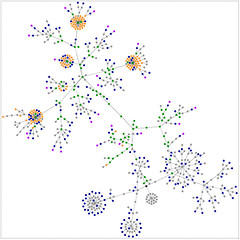 Image by SCSpaeth aka k6 via Flickr
Image by SCSpaeth aka k6 via Flickr
Within a few weeks, the District hired me part-time to advise the iTeams; and gave me a link75.org email address. I tried to switch the email address of my SCSpaeth Elgg account from the personal address to the work address and in the process, lost access to the Elgg account. So, then I created a new Elgg account that conformed to the standard district naming conventions: spaeths and have continued my work in Elgg under that account. The double accounts confuse some Elgg users because they invite me to become their friend using my inactive account. But, I don't even get notified much less have the capacity to respond. But I have valuable parts of my working portfolio tied up in the inaccessible account so I haven't wanted to wipe the slate clean. This reposting of a post from that account is an effort to find out what it will take to recover those parts of my portfolio in a more accessible venue. I copied the post below.
I chose to make this adjustment now because I tried to use Yahoo Pipes to learn how to aggregate posts from multiple sources and discovered that Pipes threw an error for the SCSpaeth Elgg blog feed.
-----------------------------------------------------------------------------------------------------------
Joint work- the strongest form of collaboration
October 29, 2008 by Stephen Spaeth comments (1)
I have been reading Fullan and Hargreaves' book What's Worth Fighting for in Your School. I find it very helpful because of the respect they accord teachers and the solid recommendations of ways to support transformation. During a Graduate Coordinating Committee meeting on Monday, I saw an application of the concept of strong forms of collaboration to our work. Since we don't have common language around this idea, I found this paragraph from the book to share the gist of the idea (Fullan and Hargreaves, 1996 p.47):
Little [1990] observes that the fourth type -joint work- is the strongest form of collaboration (e. g. team teaching, planning, observation, action research, sustained peer coaching, and mentoring, etc.). Joint work implies and creates stronger interdependence, shared responsibility, collective commitment and improvement, and greater readiness to participate in the difficult business of review and critique. This, says Little, is the kind of collaborative work and culture most likely to lead to significant improvement. In the quest for improvement, other kinds of collaboration may support this basic thrust, but by themselves are likely to be poor substitutes for it.
What can we do to build support for this strongest form of collaboration? How can iTeams contribute to this form of collaboration, too?
--------
Little, J.W. (1990) "The persistence of privacy: Autonomy and initiative in teachers' professional relations" Teachers College Record 91 (4), 509-36 cited in Fullan, M. and Hargreaves, A. What's Worth Fighting for in Your School, Teachers College Press, New York 1996.
-----------------------------------------------------------------------------------
SC Spaeth cites this post in http://elgg.link75.org/pg/pages/view/62/
Stephen Spaeth 132 days ago
![Reblog this post [with Zemanta]](http://img.zemanta.com/reblog_e.png?x-id=398d6e08-65c2-4265-a3df-40f19f7bb7a9)



No comments:
Post a Comment